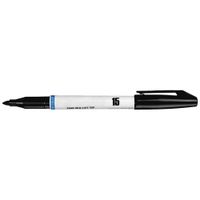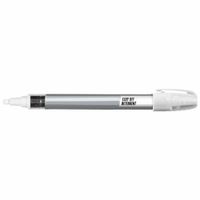Call +(254) 703 030 000 / 751 483 999 / 721 704 777
- Home
- Tools
- Measuring Layout Tools
- Marking Tools
- Industrial Ink Markers
.....Read More
Frequently Asked Questions
What are industrial ink markers used for?
Industrial ink markers are specialized tools used for marking, labeling, and identifying various materials and surfaces in industrial settings. They are designed to withstand harsh conditions such as extreme temperatures, moisture, and exposure to chemicals, making them suitable for use in manufacturing, construction, and other heavy-duty environments.
These markers are commonly used for:
1. **Metal Marking**: They are used to mark metal surfaces for identification, quality control, or assembly instructions. The ink is often resistant to heat and abrasion, ensuring the markings remain visible during processing.
2. **Construction**: In construction, they are used to mark measurements, cut lines, or installation instructions on materials like concrete, wood, and metal.
3. **Automotive and Aerospace**: In these industries, markers are used for part identification, quality checks, and to indicate inspection status. The ink must adhere to various surfaces and withstand environmental conditions.
4. **Textile and Fabric**: They are used to mark fabrics for cutting, sewing, or quality control. The ink is often designed to be removable or permanent, depending on the application.
5. **Plastics and Glass**: Industrial markers are used to label plastic and glass products, often requiring inks that can adhere to smooth, non-porous surfaces.
6. **Pipe and Cable Identification**: They are used to mark pipes and cables for identification, ensuring proper installation and maintenance.
7. **Inventory and Shipping**: Markers are used to label boxes, pallets, and containers for inventory management and shipping, providing clear and durable markings.
Overall, industrial ink markers are essential for ensuring accuracy, safety, and efficiency in various industrial processes, providing reliable and durable markings that withstand challenging conditions.
How do industrial ink markers differ from regular markers?
Industrial ink markers differ from regular markers in several key aspects:
1. **Ink Composition**: Industrial markers use specialized inks designed for durability and resistance to harsh conditions. These inks are often oil-based, solvent-based, or paint-based, allowing them to adhere to a wide range of surfaces, including metal, glass, plastic, and wood. Regular markers typically use water-based or alcohol-based inks suitable for paper and other porous surfaces.
2. **Durability**: The ink in industrial markers is formulated to withstand extreme temperatures, UV exposure, chemicals, and abrasion. This makes them ideal for environments where markings need to remain legible over time. Regular markers are not designed for such conditions and may fade or wash away.
3. **Surface Compatibility**: Industrial markers can write on non-porous, oily, or dirty surfaces, which is essential in manufacturing and construction settings. Regular markers generally require clean, dry surfaces for optimal performance.
4. **Tip Design**: Industrial markers often feature robust tips made from materials like felt, metal, or plastic, designed to withstand rough surfaces and extended use. Regular markers have softer tips that may wear down quickly on abrasive surfaces.
5. **Application**: Industrial markers are used for labeling, coding, and marking in sectors like automotive, aerospace, and construction. They are essential for quality control, inventory management, and safety markings. Regular markers are used for everyday tasks like writing, drawing, and coloring.
6. **Longevity**: Industrial markers are designed for long-term use, with inks that do not dry out quickly. Regular markers may dry out faster, especially if left uncapped.
7. **Cost**: Due to their specialized features, industrial markers are generally more expensive than regular markers.
Are industrial ink markers permanent or removable?
Industrial ink markers can be either permanent or removable, depending on their formulation and intended use. Permanent industrial markers are designed to create long-lasting marks that resist fading, water, and abrasion. They are typically used for labeling, coding, or marking on surfaces like metal, plastic, glass, and wood, where durability is essential. These markers often contain solvent-based inks that adhere strongly to surfaces and are difficult to remove once dried.
On the other hand, removable industrial markers are formulated to allow for easy cleaning or erasure from surfaces. They are ideal for temporary markings, such as on whiteboards, glass, or other non-porous surfaces where the marks need to be changed or updated frequently. These markers usually contain water-based or alcohol-based inks that can be wiped off with a damp cloth or a specific cleaning solution.
The choice between permanent and removable markers depends on the specific requirements of the task at hand. Users should consider factors such as the type of surface, the need for mark longevity, and the ease of removal when selecting the appropriate marker for their industrial applications.
What surfaces can industrial ink markers be used on?
Industrial ink markers can be used on a wide variety of surfaces due to their durable and versatile ink formulations. These surfaces include:
1. **Metal**: Ideal for marking steel, aluminum, and other metal surfaces, often used in manufacturing and construction.
2. **Glass**: Suitable for temporary or permanent markings on glass surfaces, commonly used in automotive and architectural applications.
3. **Plastic**: Effective on various plastics, including PVC, polyethylene, and polypropylene, used in packaging and product labeling.
4. **Wood**: Can be used on both finished and unfinished wood surfaces, useful in carpentry and furniture making.
5. **Rubber**: Works well on rubber surfaces, often used in tire manufacturing and other rubber products.
6. **Ceramic**: Suitable for marking ceramic tiles and pottery, used in construction and art.
7. **Stone**: Can be used on natural and synthetic stone surfaces, useful in masonry and landscaping.
8. **Textiles**: Some industrial markers are designed for use on fabrics, used in garment manufacturing and design.
9. **Cardboard and Paper**: Effective for labeling and marking in packaging and shipping industries.
10. **Concrete**: Suitable for marking concrete surfaces, used in construction and roadwork.
11. **Leather**: Can be used on leather surfaces for crafting and manufacturing.
12. **Foam**: Works on foam materials, used in packaging and insulation.
These markers are designed to provide long-lasting, visible marks that can withstand various environmental conditions, including heat, moisture, and abrasion.
How do you remove markings made by industrial ink markers?
To remove markings made by industrial ink markers, follow these steps:
1. **Identify the Surface**: Determine the type of surface (metal, plastic, fabric, etc.) as this will influence the cleaning method.
2. **Test a Small Area**: Before applying any cleaning solution, test it on a small, inconspicuous area to ensure it doesn't damage the surface.
3. **Use Rubbing Alcohol**: Apply isopropyl alcohol (70% or higher) to a clean cloth or cotton ball. Gently rub the ink stain in a circular motion. Alcohol is effective on non-porous surfaces like metal and plastic.
4. **Try Acetone or Nail Polish Remover**: For stubborn stains, use acetone or nail polish remover. Apply it to a cloth and rub the stain. Be cautious as acetone can damage some plastics and finishes.
5. **Apply Commercial Ink Remover**: Use a commercial ink remover designed for industrial inks. Follow the manufacturer's instructions carefully.
6. **Use Baking Soda Paste**: Mix baking soda with water to form a paste. Apply it to the stain and scrub gently with a soft brush. This is suitable for more delicate surfaces.
7. **Try Vinegar and Dish Soap**: Mix equal parts of white vinegar and dish soap. Apply the mixture to the stain and scrub with a cloth or brush.
8. **Rinse and Dry**: After removing the ink, rinse the area with water to remove any residue from the cleaning agents. Dry the surface thoroughly.
9. **Repeat if Necessary**: Some stains may require multiple treatments. Repeat the process if needed.
10. **Protect the Surface**: Once clean, consider applying a protective coating to prevent future stains.
Always ensure proper ventilation when using chemical cleaners and wear gloves to protect your skin.
Are industrial ink markers weather-resistant?
Yes, industrial ink markers are generally designed to be weather-resistant. These markers are formulated to withstand various environmental conditions, making them suitable for outdoor use and in harsh industrial settings. The ink used in these markers is typically waterproof, ensuring that it does not wash away when exposed to rain or moisture. Additionally, the ink is often UV-resistant, which helps prevent fading when exposed to sunlight over time.
Industrial ink markers are also designed to adhere to a wide range of surfaces, including metal, plastic, wood, and glass, which are commonly found in industrial environments. This versatility ensures that the markings remain legible and intact despite exposure to different weather conditions.
Moreover, the durability of these markers extends to their resistance to abrasion and chemicals, which further enhances their longevity and reliability in challenging conditions. This makes them ideal for applications such as labeling, marking, and identifying equipment, parts, or areas in outdoor and industrial settings.
However, the level of weather resistance can vary between different brands and types of industrial ink markers. It is important to select a marker that specifically states its weather-resistant properties to ensure it meets the requirements of the intended application.
What are the best brands of industrial ink markers?
Some of the best brands of industrial ink markers include:
1. **Sharpie**: Known for its durability and versatility, Sharpie offers industrial markers that are resistant to water, fading, and abrasion. They are suitable for a variety of surfaces, including metal, glass, and plastic.
2. **Dykem**: Dykem markers are popular in industrial settings for their high visibility and resistance to extreme conditions. They are often used for metalworking and other heavy-duty applications.
3. **Markal**: Markal provides a range of industrial markers designed for tough environments. Their products are known for their long-lasting ink and ability to mark on oily, wet, or rough surfaces.
4. **Staedtler**: Staedtler offers permanent markers that are ideal for industrial use, with features like quick-drying ink and resistance to smudging and fading.
5. **Uni Paint**: Uni Paint markers are favored for their opaque, vibrant colors and ability to write on a variety of surfaces, including metal, wood, and glass. They are also known for their durability and weather resistance.
6. **Artline**: Artline industrial markers are designed for high-performance marking, with features like fast-drying, water-resistant ink that adheres well to different materials.
7. **Pilot**: Pilot's range of industrial markers includes options that are permanent, water-resistant, and suitable for marking on a wide array of surfaces.
8. **Sakura**: Sakura offers industrial markers with features like fade-resistant ink and the ability to mark on both porous and non-porous surfaces.
These brands are recognized for their quality, reliability, and ability to perform in demanding industrial environments.

